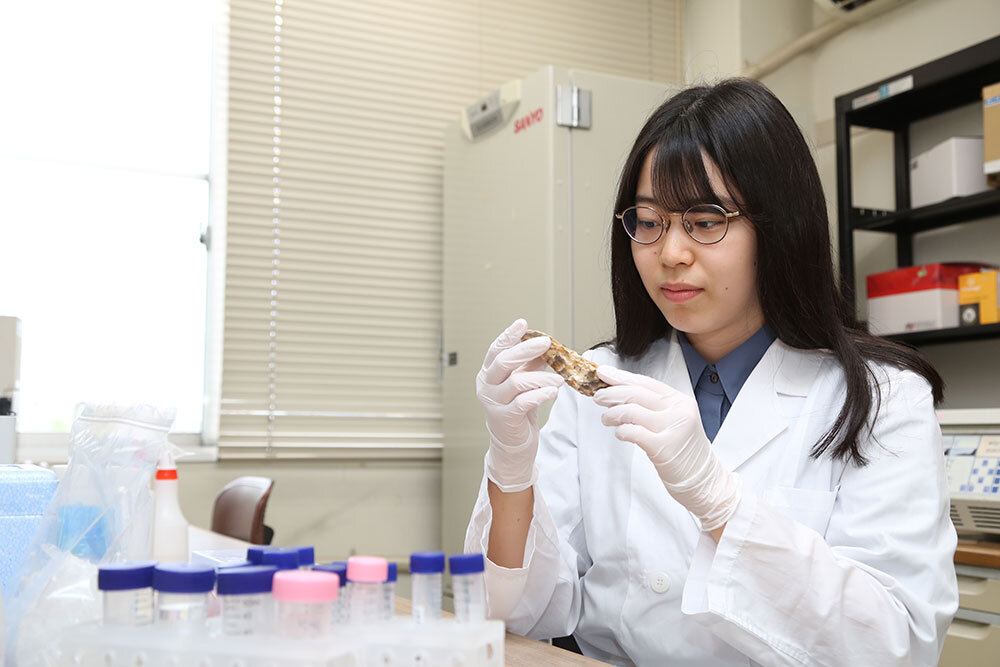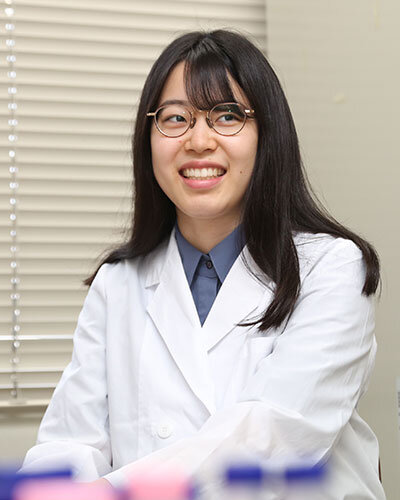INTRODUCTION学生紹介
- HOME
- support
- Student Introduction
- WATANABE REON
STUDENT INTRODUCTION
Marine Policy and Management
WATANABE REON
Specializations:Marine Policy
Main academic advisor:Matsui Takahiro
Mentor:LIANHUI, Wu / KITAKADO, Toshihide

Aspiring to support fishers in the future as a researcher who understands the front lines of the fisheries industry
Combining Social Science, Natural Science and AI to cope with environmental changes
Adapting to marine environmental changes is our important issue that needs to be addressed. During my undergraduate studies, I have researched the impact of environmental change on the rationality of the local farming ground allocation system in Japan. At the study site, fishers have designed farming ground allocation rules that prioritize small-scale fishers. Fishers have empirically evaluated a better location for feeding and they have allocated the best location equally to all fishers. I analyzed the oyster productivities of each farming ground by a marine environmental survey and an oyster culturing experiment to determine whether this system functions fairly as envisioned. The results showed that the system did not function as intended when environmental conditions differed significantly from every year.
In graduate school, I plan to research how fishers can adapt to environmental changes. For example, if the environmental conditions of each farming grounds can be predicted by AI, it may be possible to respond to environmental changes by flexibly changing the system or moving oysters to better farming grounds. I would like to research what actions fishers can take to adapt to changes, and what challenges they face as they try to take new actions.
Communication with fishers is essential in my research. When I showed the data to the fishers, they often responded with, "This was as expected, but what happened over here?" The fishers have a deep understanding of the sea based on their daily experiences, but it seems that our data can provide them with new insights. It is rewarding to feel that my work is directly connected to and helpful to the fishers' work.
The marine environment is changing dramatically. In the future, the fisheries will need to adapt to such changes as well. However, it is difficult for fishers to adapt to changes based on only their experience. Through my research, I would like to support fishers' decision-making.
The appeal of the WISE Program: Learning AI with students from different majors
 I became interested in the WISE Program when I heard from a senior lab member who was in the program that I could learn AI with students from different majors. It's said that in graduate school, you often only interact with people from the same laboratory. The WISE Program seemed appealing in terms of connecting with new people, so I definitely wanted to participate.
I became interested in the WISE Program when I heard from a senior lab member who was in the program that I could learn AI with students from different majors. It's said that in graduate school, you often only interact with people from the same laboratory. The WISE Program seemed appealing in terms of connecting with new people, so I definitely wanted to participate.
Although I had no prior experience studying AI and was close to being a beginner, I understood that knowledge is essential in the near future. I might be able to learn to use AI through self-study, but studying in the WISE Program would likely be more systematically. So, I decided to join the program because it's a choice that will benefit me.
My laboratory is involved in various projects. These other projects should also have room to use AI. Having AI as a research tool will broaden the scope of research.
Grateful for the comprehensive support of the WISE Program, including the mentor system and internships
The WISE Program has a mentor system where faculty members provide support for AI and technology, and there are also faculty members with whom you can consult about your career path. My supervising professor is not an AI expert, so having faculty members I can ask about AI is very helpful and reassuring.
The internship system is also attractive. An institution offering internships presented a combination of marine policy planning and AI, precisely what I want to do and am learning about. I am very interested in that. I heard from a senior student participating in the program that internships help develop various skills. Technical abilities and language skills can be honed, as there are opportunities to work with people from overseas. I think it's a great system, as it contributes to personal growth.
Developing an awareness of AI after a year of early coursework
I started taking WISE Program classes early, during my senior year of undergraduate studies. I appreciated the practical courses, which went beyond theory with assignments and required hands-on coding.
After a year of study, my new awareness and appreciation of AI make me feel that I have grown. Now, when reading papers, instead of finding the terminology difficult, I can understand how the models are being evolved and used. When watching the news, I can recognize and understand developments in AI technology. This newfound awareness of AI is a significant change for me.
In the future, I would like to become a researcher who can support the front lines. Actually, I was not very interested in the fishing industry before entering university. However, when I visited a fishing village as a freshman and helped with the fishers' work, I met a female fisher who was very cool and inspiring. I was impressed by how she worked without giving in to prejudice, which made me want to do something helpful for her. Through my graduate studies, I want to be a link between the front lines and the academia and change the fisheries for the better.

